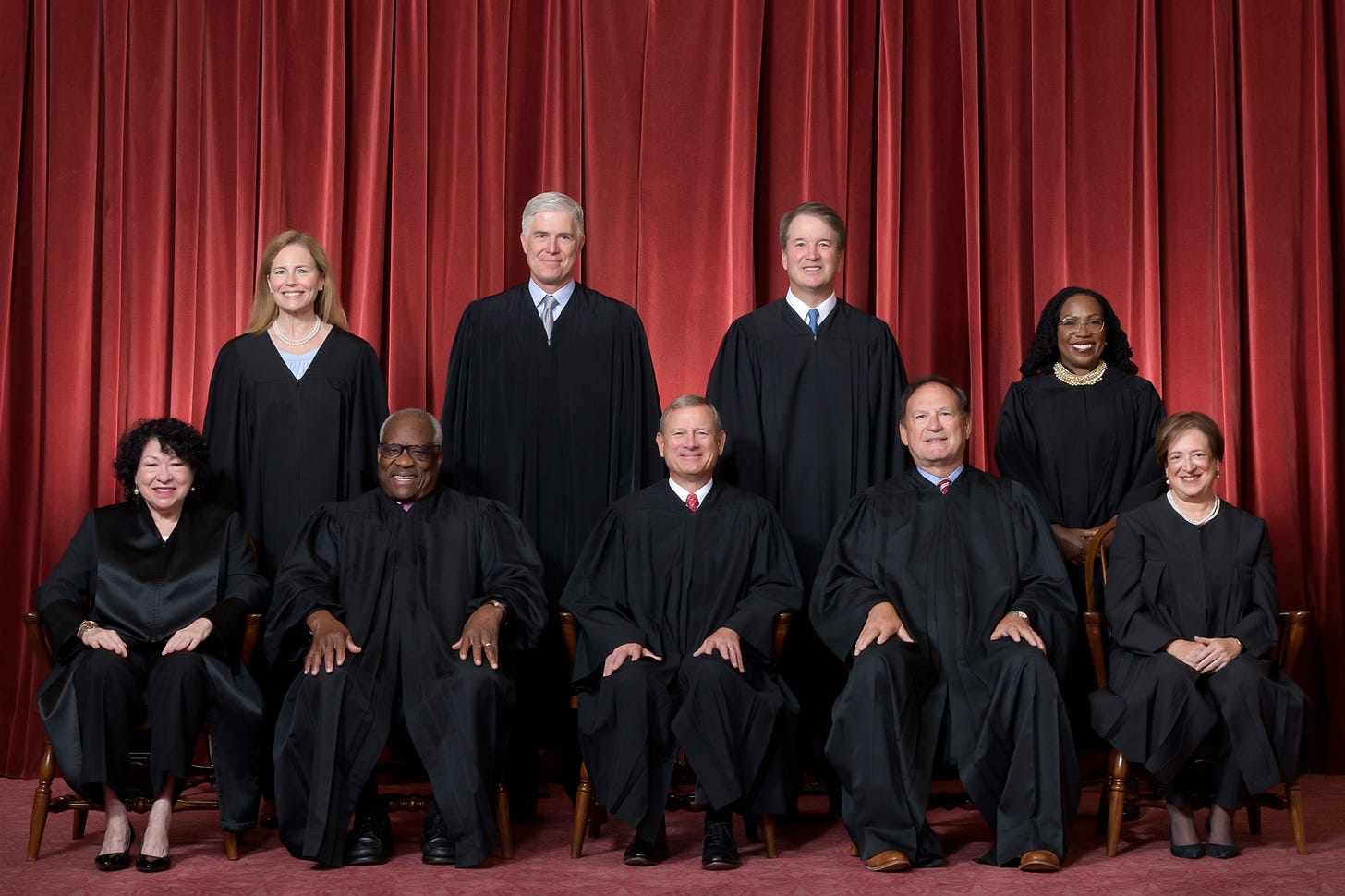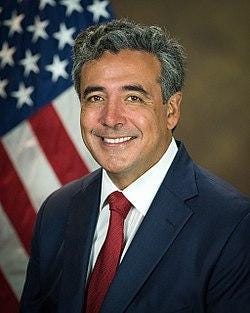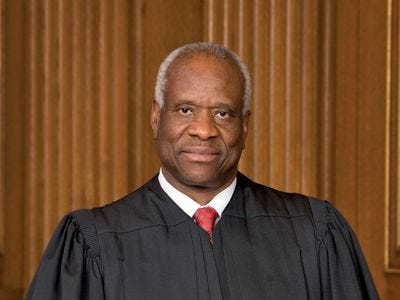What happened? How speech-protective is the Roberts Court after the 2024 term?
First Amendment News 476

“By reducing the burden on states . . . , the ruling [in Free Speech Coalition v. Paxton] risks making it easier for government to impose overbroad and/or pretextual regulations of speech (here, by limiting the ability of adults to visit these sites without providing information they may wish to keep anonymous) in contexts in which it has historically had to prove that less-restrictive means of achieving the same goal aren’t available.” — Stephen Vladeck (One First, June 30)
Four years ago, I co-authored a law review article on the Roberts Court and free speech titled “The Roberts Court—Its First Amendment Free Expression The Roberts Court—Its First Amendment Free Expression Jurisprudence: 2005–2021.” As of four years ago, I felt comfortable writing, “It is an exceptionally speech-protective Court.”
And then I added, “More than all the rest, the one who has had the most influence in shaping the overall jurisprudence thus far has been John Roberts.” He authored more First Amendment-affirming opinions than any of his colleagues, whereas Justice Clarence Thomas authored the most dissents (of the current Court), in which he typically argued against a First Amendment claim.
Those typically opposed to much of the Roberts Court’s First Amendment expansionism were liberals in the persons of Justices Elena Kagan and Sonia Sotomayor.
Well, how things have changed this last term. Take the shockingly First Amendment-hostile ruling in Free Speech Coalition v. Paxton, about which I will say more in a moment. For now, get this: The Chief assigned the majority opinion to Justice Thomas, who put his doctrinal wrecking ball to bad use in the case. The Chief Justice and his conservative colleagues also lent their names to that opinion. More surprisingly yet, the dissent was written by Elena Kagan, who was joined by Justices Sotomayor and Ketanji Brown Jackson. This time, the liberal jurists were the ones defending the free speech-affirming precedents that Justice Thomas so cavalierly discounted.
Then there is this: Putting aside the remanded cases of Villarreal v. Alaniz and Murphy v. Schmitt, and unlike previous terms, this term the Roberts Court did not sustain any First Amendment free expression claim (compare this to Mahmoud v. Taylor, a free exercise case).
In addition to the First Amendment claim denied in Free Speech Coalition, the Roberts Court also rejected a First Amendment challenge in TikTok Inc. and ByteDance Ltd v. Garland (9-0, per curiam) and Firebaugh v. Garland (9-0, per curiam).
Some important cert-denied cases
Of the dozen-plus First Amendment expression cert. cases denied review, the following were noteworthy:
Coalition Life v. City of Carbondale (Whether the Court should overrule Hill v. Colorado)
Speech First, Inc. v. Whitten (Whether university use of a bias-response team, “an official entity that solicits anonymous reports of bias, tracks them, investigates them, asks to meet with the perpetrators, and threatens to refer students for formal discipline” objectively chills students’ speech under the First Amendment.)
Henderson v. Texas (Do the First and Fourteenth Amendments prohibit the government from convicting individuals for obstructing a passageway based solely on their participation in a peaceful march on public sidewalks and streets, without evidence that the defendants themselves knowingly or intentionally obstructed any passageway or directed, authorized, ratified, or intended that others do so?)
Note: In Wynn v. Associated Press, the Court declined an invitation to reconsider New York Times v. Sullivan and Curtis Publishing Co. v. Butts.
Back to Free Speech Coalition v. Paxton: Some reactions
In a statement, Alison Boden, executive director of the Free Speech Coalition — which represents the adult media industry — said that “as it has been throughout history, pornography is once again the canary in the coal mine of free expression. The government should not have the right to demand that we sacrifice our privacy and security to use the internet. This law has failed to keep minors away from sexual content yet continues to have a massive chilling effect on adults. The outcome is disastrous for Texans and for anyone who cares about freedom of speech and privacy online.”
[…]
At least 21 other states have ‘materially similar’ age verification rules for adult content, the ruling notes. It also notes that some sites have already implemented age verification rules, though others — primarily Pornhub — have ceased operation in states like Texas instead. — Adi Robertson, The Verge (June 27)
The decision in Free Speech Coalition v. Paxton is a direct blow to the free speech rights of adults. The Court ruled that “no person — adult or child — has a First Amendment right to access speech that is obscene to minors without first submitting proof of age.” This ruling allows states to enact onerous age-verification rules that will block adults from accessing lawful speech, curtail their ability to be anonymous, and jeopardize their data security and privacy. These are real and immense burdens on adults, and the Court was wrong to ignore them in upholding Texas’s law.” — Aaron Mackey, Lisa Femia, and Jason Kelley, Electronic Frontier Foundation (June 27)
The decision in Free Speech Coalition v. Paxton effectively reverses decades of Supreme Court precedent that protects the free speech rights of adults to access information without jumping over government age-verification hurdles.” — FIRE (June 27)
The upshot of Thomas’ opinion is that the First Amendment rights of adults have been watered down. — Damon Root, Reason (June 27)
Related
Thomas Berry, “A Disappointing Supreme Court Decision Weakens Online First Amendment Protections,” Cato at Liberty (June 27)
Cert. grant case to watch for next term
Chiles v. Salazar (Whether a law that censors certain conversations between counselors and their clients based on the viewpoints expressed regulates conduct or violates the free speech clause of the First Amendment.)
Cert. granted in campaign finance case
Jordan Rubin, “Supreme Court takes up an important campaign finance case for next term,” MSNBC (June 30)
On Monday, the court agreed to hear an appeal from Republicans challenging campaign finance restrictions. The challenge comes from the National Republican Senatorial Committee and others affiliated with the GOP, represented by Noel Francisco, a former U.S. solicitor general during the first Trump administration. The current Trump administration agrees that limiting how much political parties can spend on campaigns in coordination with candidates violates the First Amendment. It likewise urged the justices to take up the issue.
That rare agreement between parties would otherwise leave the restrictions undefended. In those situations, the court will sometimes appoint a disinterested lawyer who isn’t involved in the case to represent an undefended or abandoned view.
But represented by Marc Elias, the Democratic National Committee and related groups asked the justices for permission to intervene, which the court granted in its order taking the case. “The Solicitor General’s reversal leaves the 50-year-old limitation on coordinated spending by political parties, and this Court’s 24-year-old precedent upholding it, entirely undefended before the Court,” Elias wrote in his successful intervention motion.
Justice Thomas on a cert. denied public employee speech case
The case is MacRae v. Mattos, in which the Court denied cert. In a separate opinion agreeing with the denial, Justice Clarence Thomas wrote:
Hanover Public Schools and two of its officials (collectively, respondents) fired petitioner Kari MacRae for her pre-employment political expression on the social-media platform TikTok. Through her personal account, MacRae had “liked, shared, posted, or reposted” six memes — images or other items that are ‘spread widely online’ — expressing her views that immigration laws should be enforced, that an individual’s sex is immutable, and that society should be racially color-blind. 106 F. 4th 122, 126–128, and n. 1 (CA1 2024). After her firing, MacRae sued respondents for “retaliating against her for exercising her First Amendment rights.” Id., at 130. But, the District Court granted summary judgment to respondents, and the First Circuit affirmed, finding that MacRae had not established a protected First Amendment interest under this Court’s framework for public-employee speech. Because her petition for a writ of certiorari does not squarely challenge the First Circuit’s application of that framework, I agree with our decision to deny it. I write separately, however, to raise serious concerns about the First Circuit’s approach.
[. . .]
This case turns on the balancing component of the Pickering-Garcetti framework. All agree that MacRae’s TikTok posts qualify as speech on matters of public concern, but the First Circuit concluded that the balance of interests favored respondents. That court first discounted the value of MacRae’s speech interest because her posts, which are re- reproduced below, at times spoke in what the court described as a “mocking, derogatory, and disparaging manner.”
[. . .]
The First Circuit accordingly should have discarded factors whose disruptive potential was purely speculative…
[. . .]
Even worse, the First Circuit compounded its reliance on speculative factors with consideration of illicit ones. We have made clear that the core First Amendment principle of viewpoint neutrality applies in the Pickering-Garcetti context as elsewhere.
Excerpted: ACLU lawyer Chase Strangio on the Constitution, free speech, The New York Times, and more!
There’s a fascinating article by Nicholas Confessore in The New York Times titled “How the Transgender Rights Movement Bet on the Supreme Court and Lost,” (June 19). It comes in the wake of the Court’s 6-3 tortured ruling in United States v. Skrmetti in which Tennessee’s law prohibiting certain medical treatments for transgender minors was held not subject to heightened scrutiny under the equal protection clause of the 14th Amendment and satisfies rational basis review.
The case was argued on behalf of the respondents by ACLU lawyer Chase Strangio, who is co-director of the ACLU’s LGBT & HIV Project as well as a nationally recognized expert on transgender rights. Impressive as his credentials are in defending the rights of trans people, his views on the Constitution and free speech are unsettling if only because he is an ACLU lawyer.
To be sure, he is entitled to those controversial views, but one wonders if his personal views were, hypothetically speaking, provocative when it came to race if the national ACLU would still be so “understanding.” What do you think in light of the remarks quoted from Strangio’s Wikipedia below?
Item # 1: Views on U.S. Constitution
Strangio has described himself as “a constitutional lawyer who fundamentally doesn’t believe in the Constitution.” He has called civil marriage “a fundamentally violent institution.”
Item # 2: Personal views on free speech
In November 2020, journalist Glenn Greenwald criticized Strangio’s comments about the book Irreversible Damage: The Transgender Craze Seducing Our Daughters by Abigail Shrier. Strangio, who had tweeted that “stopping the circulation of this book and these ideas is 100% a hill I will die on,” responded that he was not speaking for the ACLU and said he deleted his tweet because “there were relentless calls to have me fired, which I found exhausting as I was navigating work and childcare.” According to The New York Times, Strangio’s tweet had “startled traditional backers [of the ACLU], who remembered its many fights against book censorship and banning.”
Related
Glenn Greenwald, “The Ongoing Death of Free Speech: Prominent ACLU Lawyer Cheers Suppression of a New Book,” Substack (Nov. 15, 2020)
“It is nothing short of horrifying, but sadly also completely unsurprising, to see an ACLU lawyer proclaim his devotion to ‘stopping the of [a] book’ because he regards its ideas as wrong and dangerous.”
Strangio’s response on Instagram (Feb. 16, 2023)
We are called hysterical and anti-free speech when we point out the direct line between the way trans people are framed in media and the anti-trans policies and violence we see escalating around us. But I have been tracking this closely for the past 7 years and it has all progressed exactly as we warned. Our lives and bodies have been situated as a threat and now we are being excised from every imaginable legal and material protection.
If this shit was being done in my name (hey cis women) I would be beyond enraged. And not in a I am going to Tweet my disapproval enraged but preparing for mutiny in the street enraged.
I have spent the last few weeks talking to demoralized and devastated and terrified families and advocates about what is happening around them. Our energy should be building towards mass mobilization and the defense of trans life. Fuck the NYT, they are and have always been an instrumental of power. Let’s take our power.” (Emphasis added)
Item # 3: Interactions with the press
The following item is meant to provide some idea of how national ACLU lawyers interact with the national press and what conditions, if any, are demanded as a prerequisite for an interview. The quote below is from New York Times investigative reporter Nicholas Confessore:
Strangio declined to be interviewed unless I agreed to first discuss the case with him off the record; instead, he answered questions by email.
Related
Gabe Walters, “Federal court backs teachers fired over trans protest,” FIRE (June 20)
Harvard’s battle with the Trump administration continues
Juan Perez, Jr. and Megan Messerly, “Trump administration says Harvard risks ‘loss of all federal resources’ due to alleged campus antisemitism,” Politico (June 30)
The Trump administration formally accused Harvard University of violating federal civil rights laws and failing to mount an appropriate response to alleged campus antisemitism.
Monday’s notice marked a stark and renewed threat to Harvard’s federal funding amid quiet negotiations between the elite school and government authorities that have otherwise been replete with court fights, threats to Harvard’s research funding and foreign student enrollment — and the recent possibility of a detente raised by President Donald Trump.
“Failure to institute adequate changes immediately will result in the loss of all federal financial resources and continue to affect Harvard’s relationship with the federal government,” administration officials, including Justice Department civil rights chief Harmeet K. Dhillon, wrote in a letter to Harvard President Alan Garber.
More in the news
Eugene Volokh, “Court Rejects (Largely on First Amendment Grounds) Title VI Lawsuit Over Alleged Anti-Semitism at Haverford College,” The Volokh Conspiracy (July 1)
Eugene Volokh, “California Law Stops City from Flying World Flag Above U.S. and California Flag,” The Volokh Conspiracy (July 1)
“Federal Judge Weighs Whether Alabama’s Anti-DEI Law Threatens First Amendment,” First Amendment Watch (June 27)
“Judge Blocks Georgia’s Social Media Age Verification Law, Citing Free Speech Concerns,” First Amendment Watch (June 27)
William Harris, “Orchestrated silence: How one of America’s most elite music schools expelled a student for reporting harassment,” FIRE (June 26)
2024-2025 SCOTUS term: Free expression and related cases
Cases decided
Villarreal v. Alaniz (Petition granted. Judgment vacated and case remanded for further consideration in light of Gonzalez v. Trevino, 602 U. S. ___ (2024) (per curiam))
Murphy v. Schmitt (“The petition for a writ of certiorari is granted. The judgment is vacated, and the case is remanded to the United States Court of Appeals for the Eighth Circuit for further consideration in light of Gonzalez v. Trevino, 602 U. S. ___ (2024) (per curiam).”)
TikTok Inc. and ByteDance Ltd v. Garland (9-0: The challenged provisions of the Protecting Americans from Foreign Adversary Controlled Applications Act do not violate petitioners’ First Amendment rights.)
Cases for next term
Pending petitions
Petitions denied
MacRae v. Mattos (Thomas, J., special opinion)
L.M. v. Town of Middleborough (Thomas, J., dissenting, Alito, J., dissenting)
No on E, San Franciscans Opposing the Affordable Care Housing Production Act, et al. v. Chiu
Emergency applications
Yost v. Ohio Attorney General (Kavanaugh, J., “IT IS ORDERED that the March 14, 2025 order of the United States District Court for the Southern District of Ohio, case No. 2:24-cv-1401, is hereby stayed pending further order of the undersigned order of the Court. It is further ordered that a response to the application be filed on or before Wednesday, April 16, 2025, by 5 p.m. (EDT).”)
Free speech-related
Mahmoud v. Taylor (Argued April 22 / free exercise case: issue: Whether public schools burden parents’ religious exercise when they compel elementary school children to participate in instruction on gender and sexuality against their parents’ religious convictions and without notice or opportunity to opt out.)
Thompson v. United States (decided: 3-21-25/ 9-0 with special concurrences by Alito and Jackson) (interpretation of 18 U. S. C. §1014 re “false statements”)
Last scheduled FAN
This article is part of First Amendment News, an editorially independent publication edited by Ronald K. L. Collins and hosted by FIRE as part of our mission to educate the public about First Amendment issues. The opinions expressed are those of the article’s author(s) and may not reflect the opinions of FIRE.








Freedom of thought falls within Free Speech. That’s viewpoint diversity.